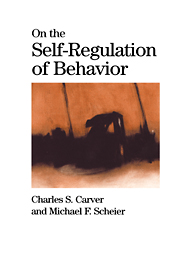Book contents
- Frontmatter
- Contents
- Preface
- Acknowledgments
- 1 Introduction and Plan
- 2 Principles of Feedback Control
- 3 Discrepancy-Reducing Feedback Processes in Behavior
- 4 Discrepancy-Enlarging Loops, and Three Further Issues
- 5 Goals and Behavior
- 6 Goals, Hierarchicality, and Behavior: Further Issues
- 7 Public and Private Aspects of the Self
- 8 Control Processes and Affect
- 9 Affect: Issues and Comparisons
- 10 Expectancies and Disengagement
- 11 Disengagement: Issues and Comparisons
- 12 Applications to Problems in Living
- 13 Hierarchicality and Problems in Living
- 14 Chaos and Dynamic Systems
- 15 Catastrophe Theory
- 16 Further Applications to Problems in Living
- 17 Is Behavior Controlled or Does It Emerge?
- 18 Goal Engagement, Life, and Death
- References
- Name Index
- Subject Index
3 - Discrepancy-Reducing Feedback Processes in Behavior
Published online by Cambridge University Press: 05 June 2012
- Frontmatter
- Contents
- Preface
- Acknowledgments
- 1 Introduction and Plan
- 2 Principles of Feedback Control
- 3 Discrepancy-Reducing Feedback Processes in Behavior
- 4 Discrepancy-Enlarging Loops, and Three Further Issues
- 5 Goals and Behavior
- 6 Goals, Hierarchicality, and Behavior: Further Issues
- 7 Public and Private Aspects of the Self
- 8 Control Processes and Affect
- 9 Affect: Issues and Comparisons
- 10 Expectancies and Disengagement
- 11 Disengagement: Issues and Comparisons
- 12 Applications to Problems in Living
- 13 Hierarchicality and Problems in Living
- 14 Chaos and Dynamic Systems
- 15 Catastrophe Theory
- 16 Further Applications to Problems in Living
- 17 Is Behavior Controlled or Does It Emerge?
- 18 Goal Engagement, Life, and Death
- References
- Name Index
- Subject Index
Summary
Our waking lives are filled with behavior. We haul ourselves out of bed each morning and set off for the day. We do much that's mundane and even trivial. Sometimes we do things we think are important at the moment but will later decide didn't matter much after all. Sometimes we do things that seem trivial at the time but will later seem more momentous. Occasionally our actions involve our core sense of self, though this is probably rare for most people. A lot of human behavior, after all, is an extended process of maintenance activity – buying groceries, washing dishes, driving from place to place to get things. Some behavior involves a lot of physical movement, but some of our most important behavior involves moving little more than our mouths and eyes.
FEEDBACK CONTROL IN HUMAN BEHAVIOR
In this chapter we argue that all these behaviors embody the processes of feedback control. We didn't invent this idea. Explicit statements about it go back at least to Miller, Galanter, and Pribram's (1960) book Plans and the Structure of Behavior (see also Hunt, 1965; MacKay, 1963, 1966; Powers, 1973a, 1973b), and ideas underlying it go back much further (chap. 3 of Miller et al., 1960, reviews the history of related thought). We're part of a second generation of psychologists who regard it as plausible.
Early Applications of Feedback Principles
The first theorists to argue for the idea that feedback processes are important in macro-level human behavior were Miller, Galanter, and Pribram (1960).
- Type
- Chapter
- Information
- On the Self-Regulation of Behavior , pp. 29 - 47Publisher: Cambridge University PressPrint publication year: 1998



